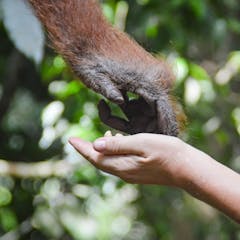
Articles on Indigenous knowledge
Displaying 21 - 40 of 118 articles

A fascinating new collection of essays explores Indigenous deep histories and conceptions of time, showing pre-colonial Australia’s rich human past.

First Nations people should have a real say in decisions affecting them and their Country. Here, we look at how two current policy-making efforts measure up.

The huge gathering of policymakers focused on culture’s crucial role in sustainable development.

A recurrent theme in the testimonies of Residential School survivors is how their cultural and linguistic identities were adversely affected.

Indigenous views and ways of knowing should be applied to the way we keep, use, and kill animals, and in how we teach future generations about animal use and their care.

Almost 200 countries are reckoning with the world’s extraordinary loss of the variety of life at the COP15 nature summit in Canada. Here’s why Indigenous involvement is crucial.

Seas are rising in the Torres Strait, swamping crops and graveyards. Friday’s decision by a landmark UN committee is a breakthrough for Indigenous rights and climate justice.

The struggles of monarch butterflies reflect a shared North American ecological and social problem.

First Nations communities have experienced data being collected by researchers unethically. Better practices and relationships with communities can happen through ways of sharing such as yarning.

In a new study, archaeologists have re-discovered the role boomerangs played in retouching stone tools.

Beyond revamping misleading terminology, some library science scholars and Indigenous knowledge holders are looking at how to index library materials in ways that reflect Indigenous knowledge.

Australian Governments must embrace Indigenous Nation Building if the Uluru Statement is to lead to effective structural reform and self-determined government for First Nations peoples.

First Nations peoples have known for a long time they come from the land. There is potential for others to learn and appreciate their connection to Country as a way to better care for our planet.

This NAIDOC Week, with the effects of climate change affecting Australia, It’s beyond time to listen to First Nations people who have extensive knowledge of caring for Country.

The DIALOG network forms a bridge between scientific and Indigenous knowledge. It renews the relationship between the university and the Indigenous world, which has for too long been one-sided.

Cooperating with honeyguides has been found to increase food security. It facilitates cultural traditions and enables income or trade.

Climate artists can offer a vision of tangible networks, activities, behaviours and lifestyles that, rather than damaging the planet, support planetary — and personal — health and well-being.

An Anglican Aboriginal pastor who attended the COP26 climate conference shares his perspective on Indigenous knowledge in dealing with climate change.

Literary texts are useful for environmental communication and can deal with the complexity of climate change.

International proposals to ban the trade of polar bear parts undercut Inuit rights, knowledge and decision-making.





